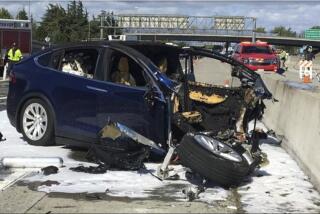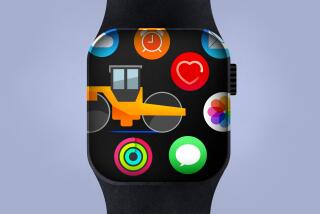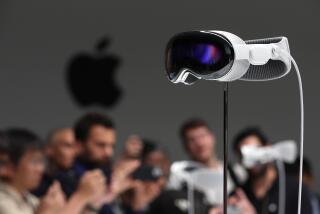STEVE JOBS’ NEXT ACT : His New PC Isn’t Ready, Forcing the Co-Founder of Apple to ‘Sell Himself’
- Share via
Will the magic work yet a third time for computer marketing whiz Steve Jobs?
After bringing the world two of its most popular personal computers, the Apple II and the Macintosh, the co-founder and former chairman of Apple Computer has been crisscrossing the country trying to win support and customers for his latest creation, the Next computer.
Although Jobs and his lieutenants are loath to acknowledge it, their task is enormous and the outcome is far from certain.
Seven months after its unveiling to a hand-picked, standing-room-only crowd in San Francisco’s symphony hall, the Next computer remains incomplete and behind schedule. It is still not for sale to the general public, it can perform few useful and routine office tasks and it has no ready-made market awaiting its arrival. Indeed, even upstart Next Inc.’s announcement of a $100-million marketing arrangement with Businessland nearly two months ago was viewed in some quarters as a sign of weakness, an admission by Jobs that he could not succeed by sticking to his original plan to exclusively serve the higher-education market.
Despite the considerable remaining hurdles, the sleek, black Next cube does have one asset no other computer available today has: charismatic 34-year-old Steven P. Jobs himself, a natural at hyping high tech.
“If his name weren’t Steve Jobs, the task he faces would be impossible,” says one software publisher. “Because of who he is, Next has a fighting chance.”
A lot is riding on Jobs’ venture. On the line are his reputation and personal fortune--Jobs has invested at least $12 million of his own money in the project. Beyond that, there is the issue of whether an entirely new computer system, with its own unique way of handling data, can find a place in a maturing market dominated by big-name manufacturers that are not about to be dazzled by Jobs’ computer.
Then again, Jobs has succeeded at this before.
The Apple II, which he fashioned with former partner Steve Wozniak, created the whole notion of a personal computer industry in 1977 at a time few even saw the necessity for these machines. Seven years later, Jobs spearheaded the design and introduction of the Macintosh, a machine that blazed new ground in computer graphics and easy-to-use operations.
Some in the computer industry believe the Next machine is yet another in Jobs’ pioneering efforts and already are lining up to see, and buy, it.
“There are enough people interested in what Jobs does that he can spend the next year or two just selling to curious tekkies, researchers and software developers. And that may be enough to get the ball rolling,” says Paul Cubbage, an analyst at Dataquest, a San Jose technology market research firm.
Jobs, intense and brash, is trying to capitalize on the excitement he’s created as he presses independent software writers and corporate computer researchers to turn their talents to developing programs that exploit the futuristic features of his system. Among the most advanced pieces of the Next machine are two proprietary chips that speed the flow of data, an erasable optical disk for data storage, a compact-disc quality sound system and, perhaps most important, an integrated internal software system that allows average users--not just computer programmers--to construct their own personal programs.
Several important software developers, such as Lotus Development and Ashton-Tate, have agreed to write programs for the Next machine, but the first of these will not be available until late this year, and even then, these initial efforts are likely to be rewrites of existing programs and not new applications that take advantage of Next’s advanced data, graphics and sound-processing capabilities.
While he waits for the programs to trickle in--and prods his software engineers, who are already about two or three months behind schedule, to complete the machine’s internal code--Jobs is wasting no opportunity to promote his machine.
For someone who is not terribly comfortable pressing the flesh, Jobs has made a remarkable number of public appearances at conventions, trade shows and other, smaller events. Still, he picks and chooses his events carefully and, according to associates, has declined all requests from reporters for interviews since the computer unveiling extravaganza last October.
“Steve’s in a marketing mode,” says one company insider.
Adds Richard Shaffer, editor of Technologic Computer Letter: “Steve is trying to create enough irrational desire to keep the company going until the real applications arrive. He’s buying time by creating the excitement that bigger, better-financed companies wished they had. To a large degree Steve is selling himself now.”
All the same, analysts say they haven’t forgotten that software is the most critical issue facing Jobs at this point. “This could be the best machine on the market,” says one analyst. “But we don’t know, and we can’t know until the software is there to take advantage of it.”
Features Called ‘Trivial’
Among the software publishers that have balked at developing software for Next is Microsoft, the world’s largest developer of personal computer programs. “We haven’t ruled out writing applications for Next entirely,” explains a spokeswoman. “But we wonder if a totally new system that doesn’t work with anything out there now can garner enough market share to justify our commitment of resources.”
Microsoft Chairman William H. Gates has been less gracious in his assessment of the machine. “Most of these features are truly trivial,” he has been quoted as saying.
Shaffer says that although he thinks the Next has “the same magic feeling” the Macintosh did at its introduction five years ago, he does not believe the Next has the financial strength to last the two years that the Macintosh needed to establish a firm footing.
Feeling the Pressure
A number of analysts say Jobs must demonstrate by October--the first anniversary of the computer’s unveiling--that the Next computer is as much reality as promise if he wants corporate buyers and analysts to continue taking the machine seriously. It’s a deadline that puts him under the gun to show some substantial progress fairly soon. To some, Jobs already shows signs of feeling that pressure.
In late March, he shifted from his original game plan of selling only to the higher-education market by cutting a marketing and service deal with Businessland, the nation’s largest business-oriented computer retail chain. Insiders say the change was made in part to lure software developers to write programs for the machine by showing them that it would have a greater audience than just the nation’s 3,000 college and university campuses.
“Next is going to have to play catch-up on software development if it intends to compete,” says Robert Herwick, a technology analyst with the San Francisco brokerage firm Hambrecht & Quist. “There are competitors out there that are already getting some of the same features as Next has. Jobs doesn’t have an open window of opportunity.”
Perhaps the best chance for Next is if someone publishes a program that opens up entire new arenas of work, much the way desktop publishing boosted the Macintosh and the way the Lotus spreadsheet created demand for the IBM personal computer.
What will Next’s key program be? “If we knew the answer, we would already have a machine doing just that,” says Stewart Alsop, publisher of a personal computer newsletter in the Silicon Valley. “That’s the whole deal about new systems.”
Even without breakthrough applications, Businessland executives have officially predicted that they will sell $100 million of Next machines in the first year, the equivalent of about 15,000 units.
Experimental Orders
Businessland’s vice president of advance systems, Kevin Compton, goes so far as to say he expects first-year sales to hit $200 million, a level that would make the Next the most successful start-up computer company ever.
Although analysts agree that plenty of corporations are willing to buy one or two Next computers for their research laboratories and software developers, they caution that initial sales for such experimental purposes do not necessarily lead to huge follow-up orders because big corporations are reluctant to scrap their existing investments in technology and start fresh.
Indeed, one technology buyer at a Fortune 500 company says he has ordered just a single Next machine for evaluation. Unless the machine turns out to be substantially more sophisticated and capable than he expects, he says he won’t purchase another.
“A new computer system coming into a business has to offer real benefit, real value,” says the buyer, who asked not to be identified. “It has to answer the question: How is this machine going to make the company more money?”
In fact, the buyer admits that the real reason for buying a Next machine is not all it would seem on the surface. “We want to know what’s inside those boxes, because we know that some of that stuff will show up in IBM machines in two or three years,” he explains.






